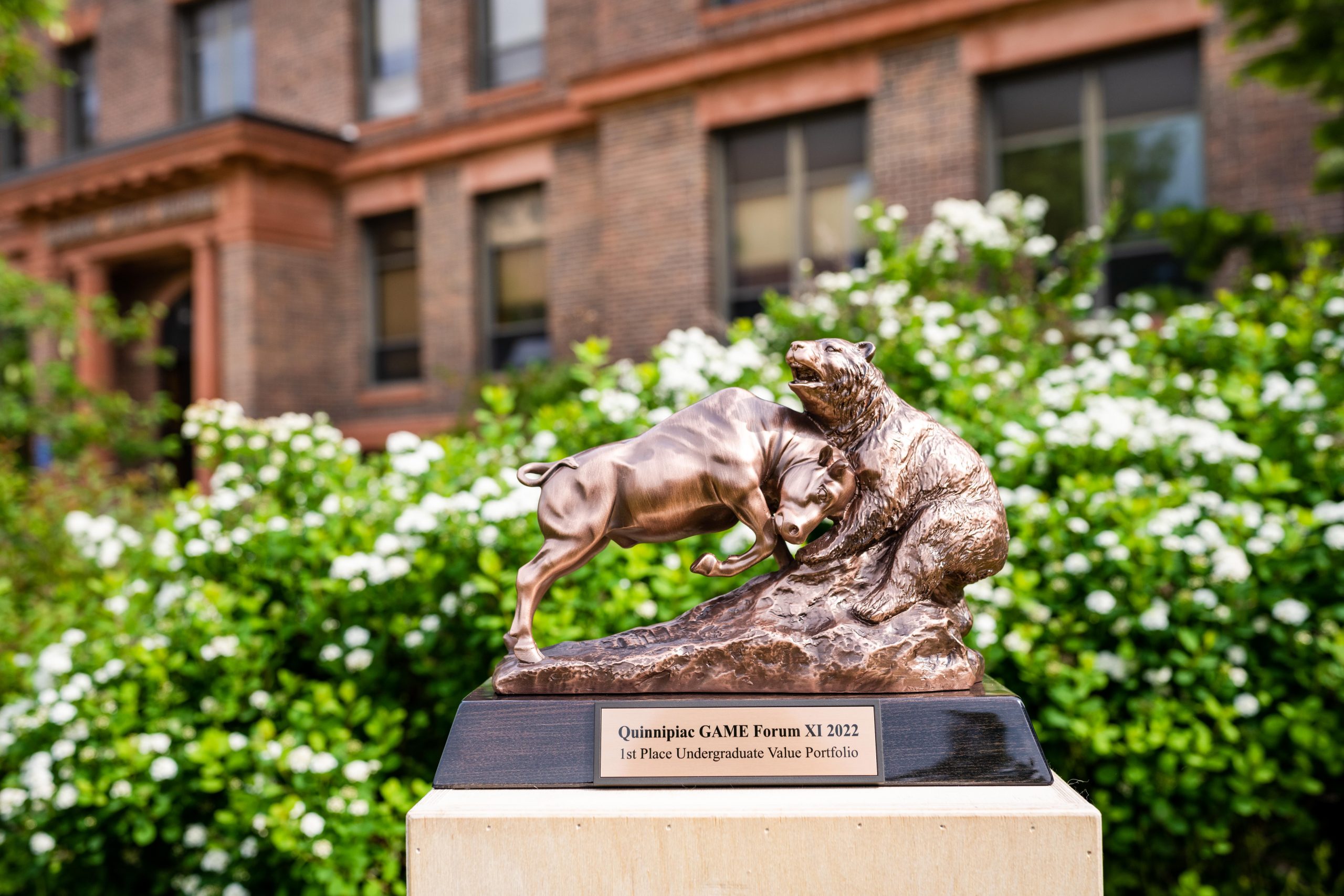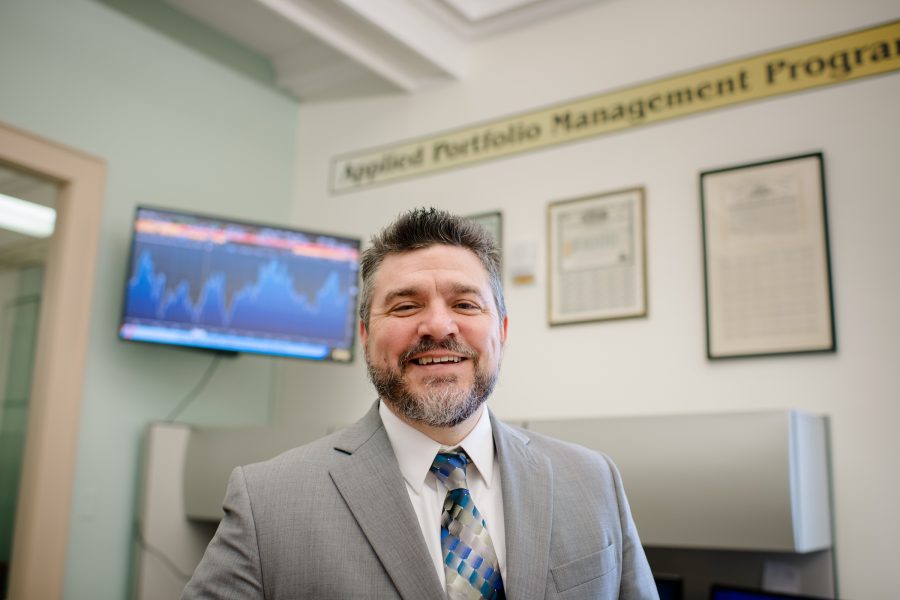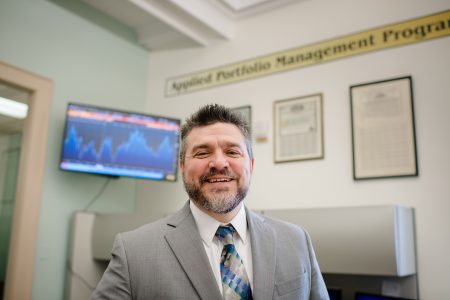
By: Kim Geiger
Jada Hamar, Luke Helsel and Jaharee Weah, all students in Michigan Tech’s Applied Portfolio Management Program, will share their knowledge on Husky Bites, a free, interactive Zoom webinar on Monday, 3/13 at 6 pm ET. Learn something new in just 30 minutes or so, with time after for Q&A! Get the full scoop and register at mtu.edu/huskybites.
Master the stock market, but make it Tech.

What are you doing for supper this Monday 3/13 at 6 p.m. ET? Grab a bite with Janet Callahan, College of Engineering dean, and Jada Hamar, Luke Helsel, and Jaharee—students in Michigan Tech’s Applied Portfolio Management Program (APMP). Joining in will be Dean Johnson, dean of the College of Business at Michigan Tech. Dr. Johnson founded and directs the program.
Just how do Michigan Tech business students consistently win national competitions investing $2 million real money? We’ll find out during Husky Bites—from the students themselves.
Each year, Michigan Tech students are selected to lead APMP for one calendar year, managing real money in US stock and bond markets. Students are chosen based on demonstrated aptitude and leadership skills in the area of finance, accounting, and financial economic theory.
In the 25 years since APMP’s founding, teams of Huskies have grown the portfolio into one of the top 50 undergraduate funds in the nation. Students in the program have opened the Nasdaq Stock Exchange and become regulars on CNBC. And although APMP is a for-credit class, the intensive experience often becomes much more of a commitment—and reward.

Luke Helsel, who is earning his bachelor’s degree in finance at Michigan Tech, would like to enter into the asset management industry upon graduation, eventually working his way into private equity or hedge fund management.
“The best part of APMP is that the program exposes students to a high end of financial and statistical topics,” Helsel says. “In addition to this, there is a large focus on applying the topics and ideas learned in APMP, rather than simply memorizing them.”
The most challenging part, and the most rewarding? “It’s the pressure of managing real money,” he adds. “In other programs, the trades are done ‘on paper’ and not executed in the real markets. The APMP provides a really unique opportunity to be able to manage actual dollars, because you get an emotional reaction from making or losing money. Managing this reaction and staying rational is one of the keys to good portfolio management. I’m very grateful to have learned this in college.”
During Husky Bites, Luke, Jada, and Jaharee promise to share their strategies. Dr. Johnson will join the session largely to serve as a co-host.
As a PhD student in 1996, Dr. Johnson interviewed for his first faculty position at Michigan Tech with a very clear vision. “Right away, I intended to establish a portfolio management program for students.” Back then, giving college students a large sum of real money to manage in financial markets was a particularly novel—and perhaps risky—idea, and Michigan Tech was just the place. And there were alumni, donors, and Michigan Tech Fund board members helping along the way. Dr. Johnson became dean in 2016.
Luke, How did you first get into your chosen major/field? What sparked your interest?
I began as a general business student with a focus on entrepreneurship at Tech in 2020. Soon I changed my major to finance because I really enjoyed the material covered in classes. I’ve chosen to pursue investment finance because the work always changes; one day is always different from the next. In addition, investment finance is sort of like finding treasure, which I really enjoy.
Family and hometown?
I was born and raised on a Christmas tree farm in Bellaire, Michigan.
What do you like to do in your spare time?
I love skiing in the winter and hiking in the summer. Lifting weights and reading are some of my year-round hobbies. I’m also a brother of the Lambda Chi Alpha fraternity on campus.

Jada, how did you first get into your field? What sparked your interest?
My dad attended Michigan Tech for finance. He’s a local banker. I didn’t initially want to follow in his footsteps until I took my first business class. I quickly realized that finance was the route I wanted to take. I enjoyed the challenge of the classes, and the number of career paths available with a finance degree was really exciting. I graduated from Michigan Tech with a BS in finance this past December. I accepted a position at Ameriprise Financial in Houghton.
Hometown, family? What do you like to do in your spare time?
I feel lucky to have grown up in this area and be able to continue my education here, too. I am the oldest of six kids, with two younger brothers and three younger sisters. I enjoy time outdoors with my husband and our two dogs—skiing in the winter, and fishing in the summer. We have a five-year-old Goldendoodle, Arlo, and Indy, a seven-month-old yellow lab.

Dr. Johnson, how did you first get into your field? What sparked your interest?
I was fascinated by stock prices at a very young age. The flow of capital to fund firms providing the goods and services most in-demand by society is the key to improving the standard of living for all.
Hometown, family, hobbies?
I live here in Houghton, Michigan. I’m married with three children. I enjoy the outdoors and sports in my spare time.
About the College of Business
The Michigan Tech College of Business offers undergraduate majors in accounting, business analytics, construction management, economics, engineering management, finance, management, management information systems, and marketing, as well as a general business option. Graduate degrees include the TechMBA®, a Master of Engineering Management, a Master of Science in Accounting, and a Master of Science in Applied Natural Resource Economics.



